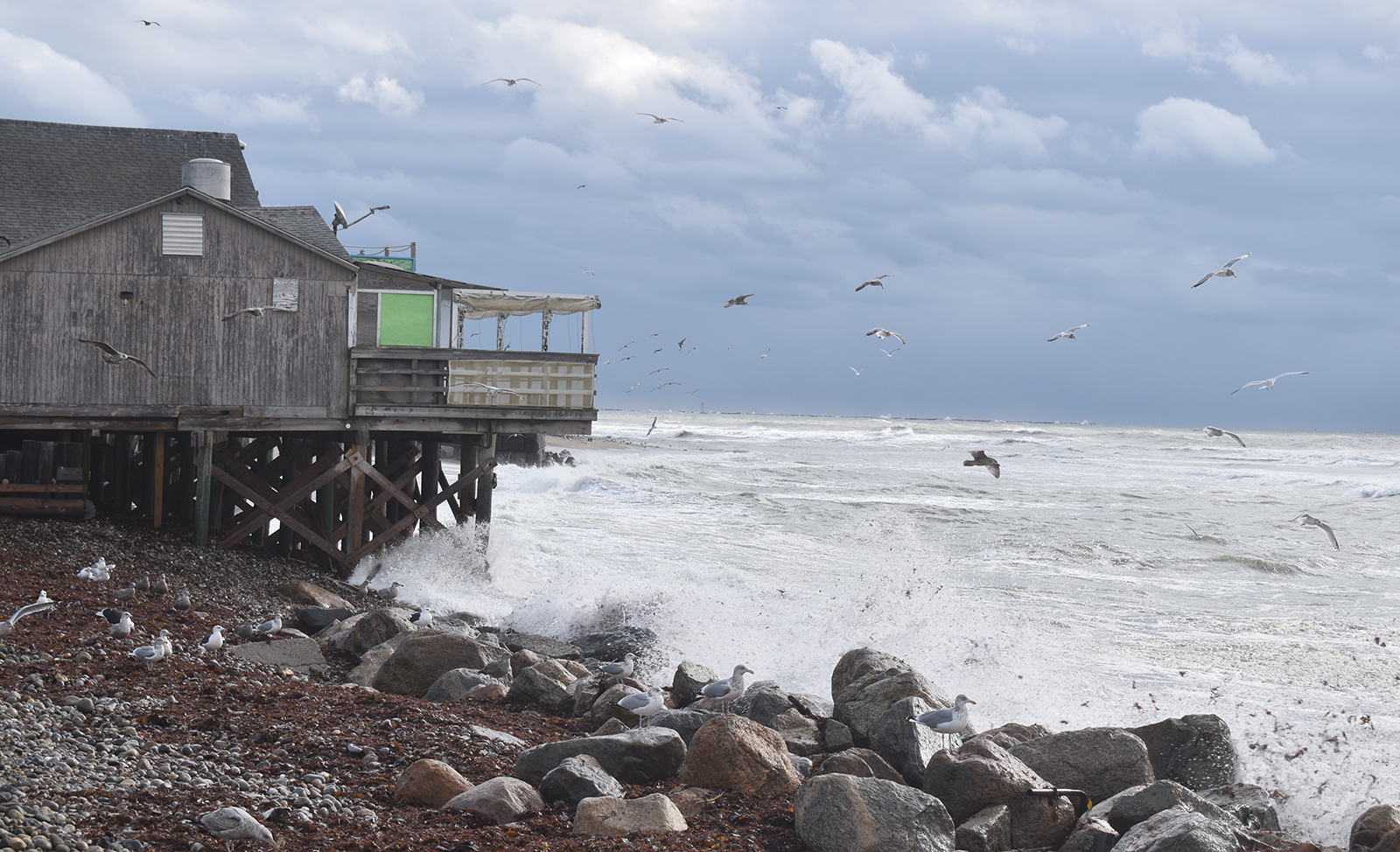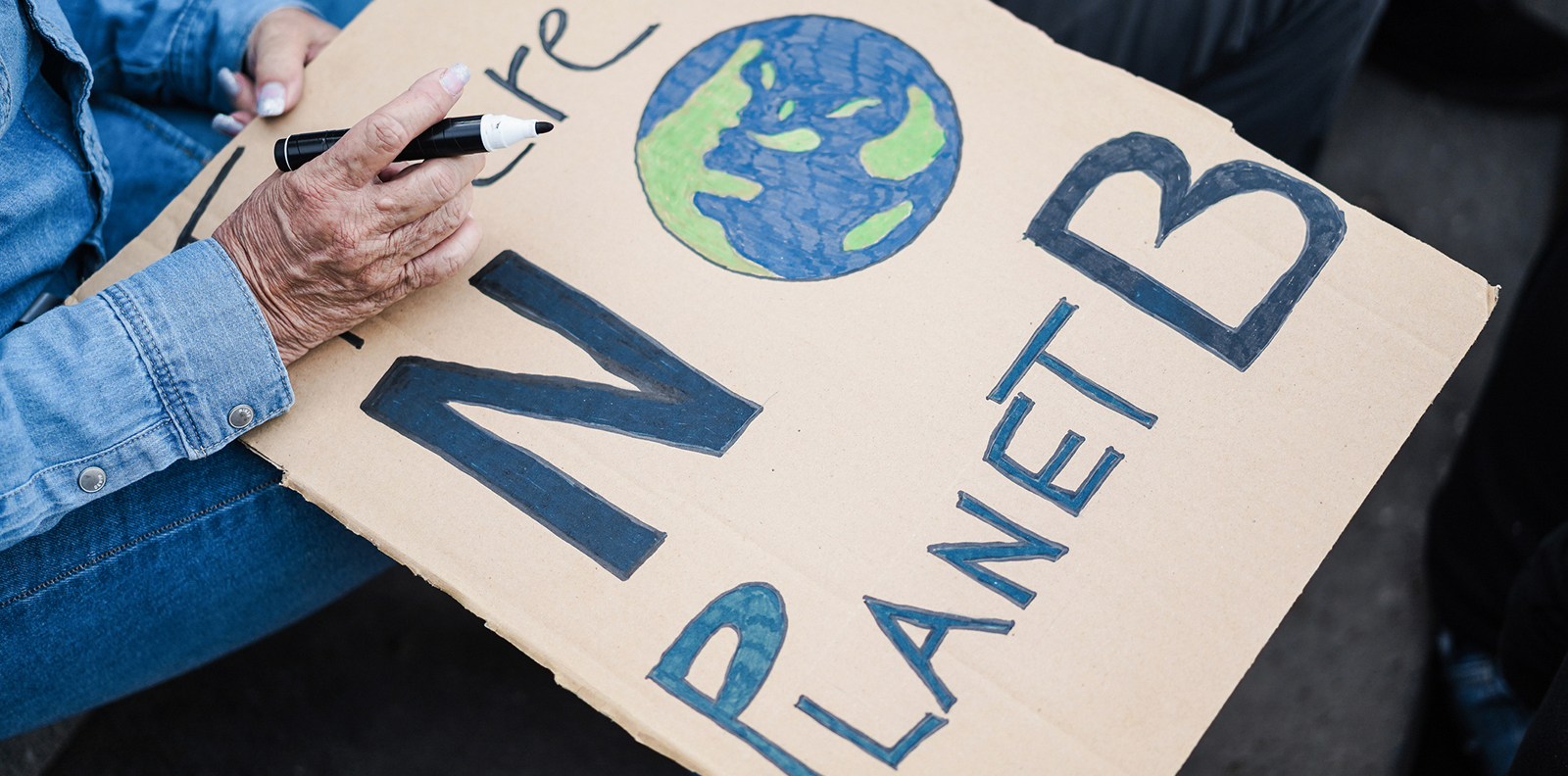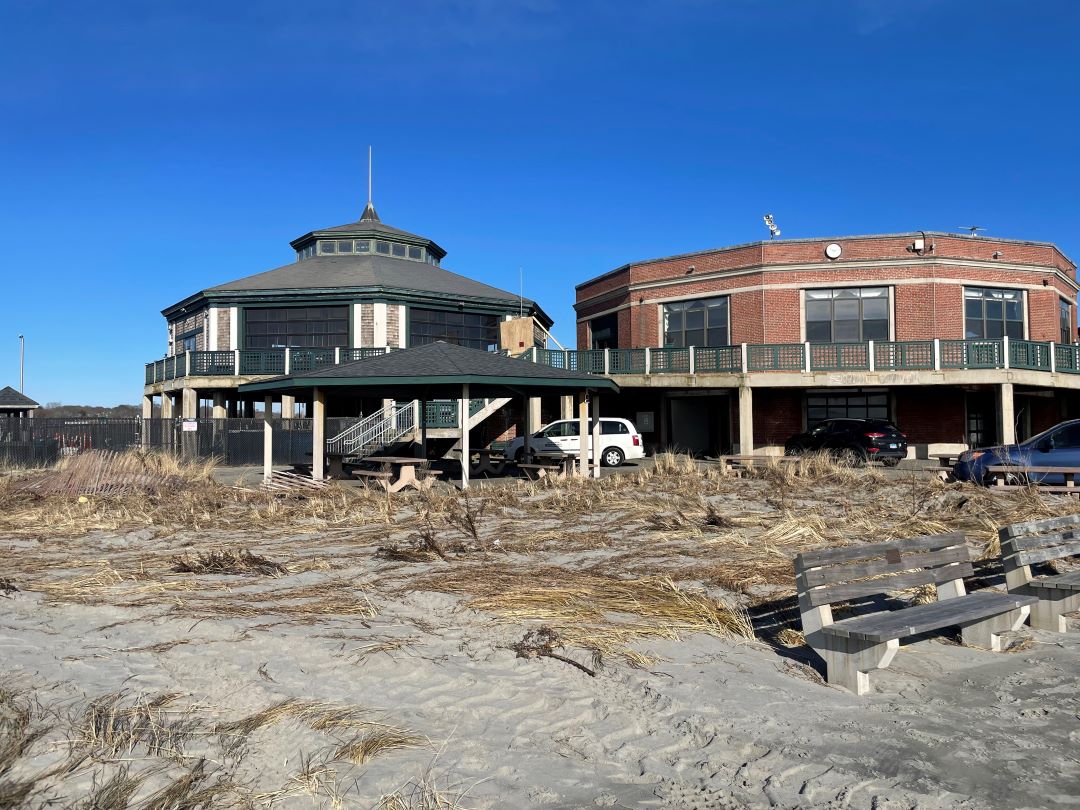Local Reaction to Latest Climate Report Stresses Need to Act Now, Protect Most Vulnerable
U.N.'s sixth assessment “is a dire warning about the consequences of inaction”
March 10, 2022
The sixth assessment by the U.N.’s Intergovernmental Panel on Climate Change (IPCC) is three times longer than Leo Tolstoy’s “War & Peace” and has all the calamity of the Bible.
The United Nations’ landmark reports are compiled by hundreds of scientists from around the world who review thousands of studies for the latest scientific information.
Like the others, the latest assessment, a 3,675-page report, is complex and difficult to parse. The report and the press release that accompanied its recent publication paint a grim picture.
“This report is a dire warning about the consequences of inaction,” said Hoesung Lee, chair of the IPCC. “It shows that climate change is a grave and mounting threat to our well-being and a healthy planet. Our actions today will shape how people adapt and nature responds to increasing climate risks.”
The assessment noted “human-induced climate change is causing dangerous and widespread disruption in nature and affecting the lives of billions of people.”
“People and ecosystems least able to cope are being hardest hit,” said the scientists who wrote the report.
To avoid mounting loss of life, biodiversity and infrastructure, the scientists said “ambitious, accelerated action is required” while at the same time “making rapid, deep cuts in greenhouse gas emissions.”
So far, the world’s progress on adaptation is uneven and there are increasing gaps between action taken and what is needed to deal with the increasing risks, according to the report.
“Healthy ecosystems are more resilient to climate change and provide life-critical services such as food and clean water,” said Hans-Otto Pörtner, an IPCC scientist. “By restoring degraded ecosystems and effectively and equitably conserving 30 to 50 percent of Earth’s land, freshwater and ocean habitats, society can benefit from nature’s capacity to absorb and store carbon, and we can accelerate progress toward sustainable development, but adequate finance and political support are essential.”
Here is a look at some of the report’s concerning findings:
The world faces unavoidable multiple climate hazards over the next two decades with global warming of 1.5 degrees Celsius (2.7 degrees Fahrenheit). Even temporarily exceeding this warming level will result in additional severe impacts, some of which will be irreversible.
Increased heat waves, droughts and floods are already exceeding plants’ and animals’ tolerance thresholds, driving mass mortalities in species such as trees and corals. These weather extremes are occurring simultaneously, causing cascading impacts that are increasingly difficult to manage. They have exposed millions of people to acute food and water insecurity.
People’s health, lives and livelihoods, as well as property and critical infrastructure, including energy and transportation systems, are being increasingly impacted by heat waves, storms, drought and flooding.
Thirty percent of the planet’s population is now exposed to potentially deadly heat for 20 or more days a year.
Forty-seven percent of local population extinctions suffered by plant and animal species is tied to the climate crisis.
The last words of the IPCC report’s summary for policymakers reads, “The cumulative scientific evidence is unequivocal: Climate change is a threat to human well-being and planetary health. Any further delay in concerted anticipatory global action on adaptation and mitigation will miss a brief and rapidly closing window of opportunity to secure a liveable and sustainable future for all.”
The latest IPCC report, coupled with other recent research and news, clearly shows the collective global society, especially those in power and the wealthy, have failed to address this emergency.
To wit:
A study published last month found warming-induced global water cycle changes pose a significant challenge to global ecosystems and human society. “This concerning finding underlines the ever more pressing need to end the emissions of gases warming the atmosphere before the water cycle changes beyond recognition,” two co-authors of the study wrote.
The average number of oil spills reported in the Gulf of Mexico every month is 25, according to the National Oceanic and Atmospheric Administration.
Last year, the amount of U.S. electricity generated by coal-fired power plants increased by 22 percent, according to the U.S. Energy Information Administration.
Gains in global renewable energy capacity from 2010 to 2020 have been outstripped by growth in fossil fuel use by a factor of three, according to Jason Hickel, an economic anthropologist, author, and professor.
A person born in 2020 is three times more likely to experience more river floods and droughts than someone born in 1960, and seven times more likely to experience more heat waves, according to a study published last year.
The richest 1 percent of the world’s population is responsible for more than twice as much carbon pollution as the poorest 50 percent, according to a 2020 report. The richest 10 percent of the global population is responsible for half the carbon emissions; the poorest half is responsible for 10 percent.

ecoRI News reached out to Rhode Island lawmakers, heads of state agencies, municipal officials, and others to get their reaction to and thoughts about the Sixth Assessment Report. Below are their lightly edited responses:
“There are organizations/entities for environmental initiatives galore in Rhode Island with all good intentions. However, unless each entity comes out of its own institutionalized silos based on the business-as-usual model, and connects with community members at the grassroots level who are living the daily reality of the climate change impacts, what’s in the IPCC report would only accelerate. Each of us play an important role for this critically important endeavor, we just need to make it collective so that we can defy the ‘divide and conquer’ system that brought current crises across environmental, social and economic facets of our society. Protesting and getting on the JEDI [justice, equity, diversity and inclusion] bandwagon may be a good start, but establishing a systemic infrastructure that ensures connecting and cultivating social norms paradigm shifts is more urgently called for. Environmental justice is social justice. We are all in this together.”
— Susan Shim Gorelick, founder and executive director of Coalition Center for Environmental Sustainability
“The global scientific community continues to demonstrate the urgency of addressing climate change. Upon reviewing the report, some of my first thoughts were around the importance of sustaining ourselves, the immediate harm already occurring to our front-line communities, and the mental health of everyone grappling with an uncertain future. Here in Providence, the Office of Sustainability continues to focus on creating policies and programs to create a healthy, equitable, low-carbon, and climate resilient city. I am hopeful that more people in our communities will feel the urgency to act on climate mitigation and adaptation, and encourage those interested to explore Providence’s Climate Justice Plan.”
— Emily Koo, director of the city of Providence’s Office of Sustainability
“The United Nations is blasting out science’s alarm to the world, making crystal clear that we have only a narrow window for action to lead the planet to safety. That narrow window requires reducing at once the greenhouse gas emissions driving climate change. No other path leaves a livable planet for our children and grandchildren. And time is short. In America’s national security and economic interests, we must free consumers from dangerous dependence on volatile oil and gas markets, by shifting to secure renewables, whose fuels are free. ‘Energy independence’ based on fossil fuels is an illusion.
“Humankind has the power to prevent the worst of what is projected in this report, but we need to get going immediately, and reject the constant, covert obstruction by the fossil fuel industry — its campaign of deception and bullying must end. This Congress may be our last chance to pass a bill that will lower emissions on the scale needed to avert major disruptions to life on our planet.”
— U.S. Sen. Sheldon Whitehouse, D-R.I.
“Our very lives depend on rapidly accelerating our efforts to cut our carbon emissions and live more sustainably. The IPCC’s report underscores the urgency of action at all levels, by all sectors, on every front, to rapidly change our consumption patterns and emissions. We don’t have the luxury of time or choice anymore. We need to work very swiftly and globally to move to clean energy and sustainable transportation, widely adopt efficient technologies throughout our economy and change behaviors in order for our planet and the species on it, including our own, to survive.”
— State Sen. Meghan E. Kallman, D-Pawtucket
“The message could not be any clearer. If we are to have any hope of avoiding the most devastating effects of our warming planet, we need to abandon incremental change in favor of quickly converting to clean energy and carbon reduction. This action needs to be worldwide, but those of us in richer, well-developed nations need to be leaders in our actions as countries, states and communities. We consume a greater share of the earth’s resources and create more of its carbon, while the poorer nations suffer a greater share of the consequences and are far less able to afford adaptation. As individuals in those developed nations, we need to be willing to live more sustainable lifestyles. We all share this planet, and our choices are what determines its future.”
— State Rep. Arthur Handy, D-Cranston
“The latest report from the IPCC shows that the world is already feeling serious effects from climate change. In Rhode Island, we are experiencing many of these changes locally, including changing habitats and fisheries, tree mortality from drought conditions and insect damage, more invasive species and harmful algal blooms, sea level rise and increased storm surges along our coasts, more intense storms, and longer, hotter summers. The report emphasizes the continued need to drive down emissions of greenhouse gases and build resiliency into our communities. Here in the Ocean State, in many ways we are on the front line experiencing these impacts and issues.”
— Terrence Gray, acting director, Rhode Island Department of Environmental Management
“It is clear from this IPCC report that climate change is creating a world in which the impacts of climate change are being disproportionately experienced by different communities. Also for the first time, this report clearly identifies the mental health impacts of climate change, including anxiety, stress, and post-traumatic stress disorder. It shows with high confidence that there is an association with extreme heat and mental health outcomes such as suicide, depression, and psychiatric hospital admissions. There is also a physical and economic toll to extreme heat. Hospitalizations for all causes rise during extreme heat and economic activity is lost when it is too hot to work outside. In Rhode Island we need to adapt to prepare for more intense storms and to support vulnerable residents who are already living on the edge economically.”
— Dr. James McDonald, interim director, Rhode Island Department of Health
“It is important to know RIDOT factors in the potential impacts of climate change on all its projects, and the asset management approach it takes for its projects identifies resiliency as a risk factor that must be addressed. RIDOT has projects to address resiliency concerns in specific areas and transportation corridors and is developing ways to adapt bridge construction and roadway design to increase resiliency and provide mitigation where needed.”
— Peter Alviti, director, Rhode Island Department of Transportation
ecoRI News reached out to Sue Stenhouse, chief of staff for the Rhode Island House Republicans, and Katie Haughey Cardoza, director of communications for the Senate Republican Office, for Republican reaction to the IPCC report. Neither caucus supplied a comment.
In an email, Stenhouse wrote, “We will not be offering comment on this topic at this time. Thanks for reaching out.” A follow-up email asking why not didn’t receive a response.
The House Republican caucus has eight members. Rep. Blake Filippi, R-New Shoreham, is the House Minority Leader. Sen. Dennis Algiere, R-Westerly, is the Senate Minority Leader.
The governor’s office also didn’t provide a comment.
Editor’s note: Emily Koo is president of the ecoRI News board of directors.




That the Republicans did not address the report says that they really do want to kill everyone.
The people and organizations who didn’t have any comment or ignored the opportunity to comment are the most important aspect of this article. They are the roadblocks as we try to make the many changes needed to survive the onslaught of climate change effects.
Above Hans-Otto Pörtner, an IPCC scientist, stated: “Healthy ecosystems are more resilient to climate change and provide life-critical services such as food and clean water. By restoring degraded ecosystems …, we can accelerate progress toward sustainable development, but adequate finance and political support are essential.”
.
So, support “Move the Water!”, which is an initiative which promotes restoring degraded ecosystems.
.
2-minute short YouTube video: https://youtu.be/vRJyCVXApAk
Peter Alviti may be trying to build roads that are less likely to be damaged from flooding or sea level rise, but RIDOT is still mostly encouraging more sprawl, more emissions, more congestion, more energy consumption by expanding highway capacity, shifting some bike/pedestrian funding to roads, and proposing to make transit worse by using transit bonds to break up the downtown bus hub. But on this topic the whole state government is doing much the same, moving some of state government out of the metro area to sprawl locations (latest is the Board of Elections) ignoring the law that requires steps to reduce state employee commuting miles, providing vast tax breaks for those with many and/or expensive cars – and the latest pro-driving subsidy – proposing to give people thousands of dollars for buying an electric car (nothing for a bicycle or transit pass!)